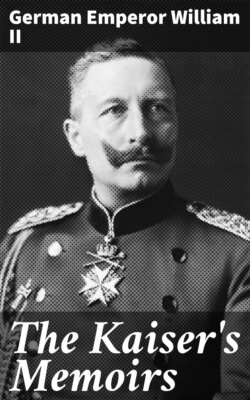Читать книгу The Kaiser's Memoirs - German Emperor William II - Страница 17
На сайте Литреса книга снята с продажи.
HIS ATTITUDE TOWARD PARTIES
ОглавлениеTable of Contents
The later periods of my reign proved that I was not hostile to any party, with the exception of the Ultra-Socialists; also, that I was not anti-Liberal. My most important Finance Minister was the Liberal, Miquel; my Minister of Commerce was the Liberal, Möller; the leader of the Liberals, Herr von Bennigsen, was Chief President of Hanover. I stood very close, especially in the second half of my reign, to an elderly Liberal deputy, whose acquaintance I made through Herr von Miquel. This man was Herr Seydel (Celchen), owner of an estate in eastern Germany—a man with two clever eyes, which gazed forth from a clean-shaven face. He worked with Miquel in railway and canal questions, and was a thoroughly able, simple, practical man—a Liberal with a streak of conservatism.
Naturally, I had numerous dealings and points of contact with the Conservative party, since the gentlemen of the country nobility often met me at court hunts and other hunts, or else came to court and served in court positions. Through them I could become thoroughly informed on all agrarian questions and learn where the farmer's shoe pinched him.
The Free Thinkers, under the "unswerving" leader, entered into no relations with me; they limited themselves to opposition.
In my conversations with Benda and Bennigsen we often spoke of the future of Liberalism, and, on one occasion, Benda made this interesting observation: "It is not necessary and also not advisable to have the Prussian heir-apparent dabble in Liberalism—we have no use for that sort of thing. He must be essentially conservative, though he must, at the same time, combine this with breadth, and avoid narrowness and prejudice against other parties."
Bennigsen agreed with me when I spoke to him of the necessity of having the National Liberals revise their program, which—originally bearing the motto: "Maintenance of the German Empire and Freedom of the Press"—had long since rallied the members around the Liberal banner—in order that, by such revision, the proselytizing power of the old brand of Prussian Liberalism should not be lost among the people. Both the Prussian Liberals and the Conservatives, I continued, made the mistake of remembering too well the old period of conflict of 1861–66; and, at elections and other political fights, they were prone to fall back into the habits of those days. That period, I said, had already passed into history and come to an end so far as our generation was concerned; the present had begun for us with the year 1870 and the new Empire; our generation had drawn a line under the year 1866; we must build anew upon the foundations of the Empire; political parties must shape their course also in this direction and not take over from the past stuff that was outworn and, moreover, calculated to create discord. Unfortunately, all this has not come to pass. Bennigsen made a very telling point when he said: "Woe to the North German Liberals if they come under the leadership of the South German Democrats, for that will mean the end of real, genuine Liberalism! Then we shall get the masked democracy arising from below, for which we have no use hereabout."
The Conservative party, honorable and faithful to its King, unfortunately has not always produced leaders of superior endowments who were at the same time skillful, tactically trained politicians. The agrarian wing was at times too strongly marked and was a burden to the party. Moreover, memories of the period of conflict were still too lively. I counseled union with the Liberals, but found little support. I often pointed out that the National Liberals in the Empire were true to the Empire and to the Emperor, for which reason they should be thoroughly welcome to the Conservatives as allies; that I could not and did not wish to govern without them in the Empire, and was absolutely unwilling to govern against them; that North German conservatism was misunderstood in some parts of the Empire because of differences in historical development; and that, therefore, the National Liberals were the natural allies. It was owing to these views of mine, for instance, that I removed Court Preacher Stöcker, a man of brilliant achievement as a social missionary, from his post, since he made a demagogical provocative speech in South Germany, aimed against the Liberals there.
The Center party was welded together by the "Kulturkampf" and was strongly anti-Protestant and hostile to the Empire. Notwithstanding this, I had dealings with many important men of the party and managed to interest them in practical collaboration for the good of all. In this Schorlemer (the father) was especially helpful to me. He never made a secret of his Prussian loyalty to his King. His son, the well-known Minister of Agriculture, even joined the Conservative party. In many matters the Center co-operated; at one period it possessed in its old leader, Windthorst, the keenest politician in the legislature. Nevertheless, in spite of all this, one could not help being aware of the underlying Centerist conviction that the interests of the Roman Church must always be maintained and never relegated to a secondary place.
